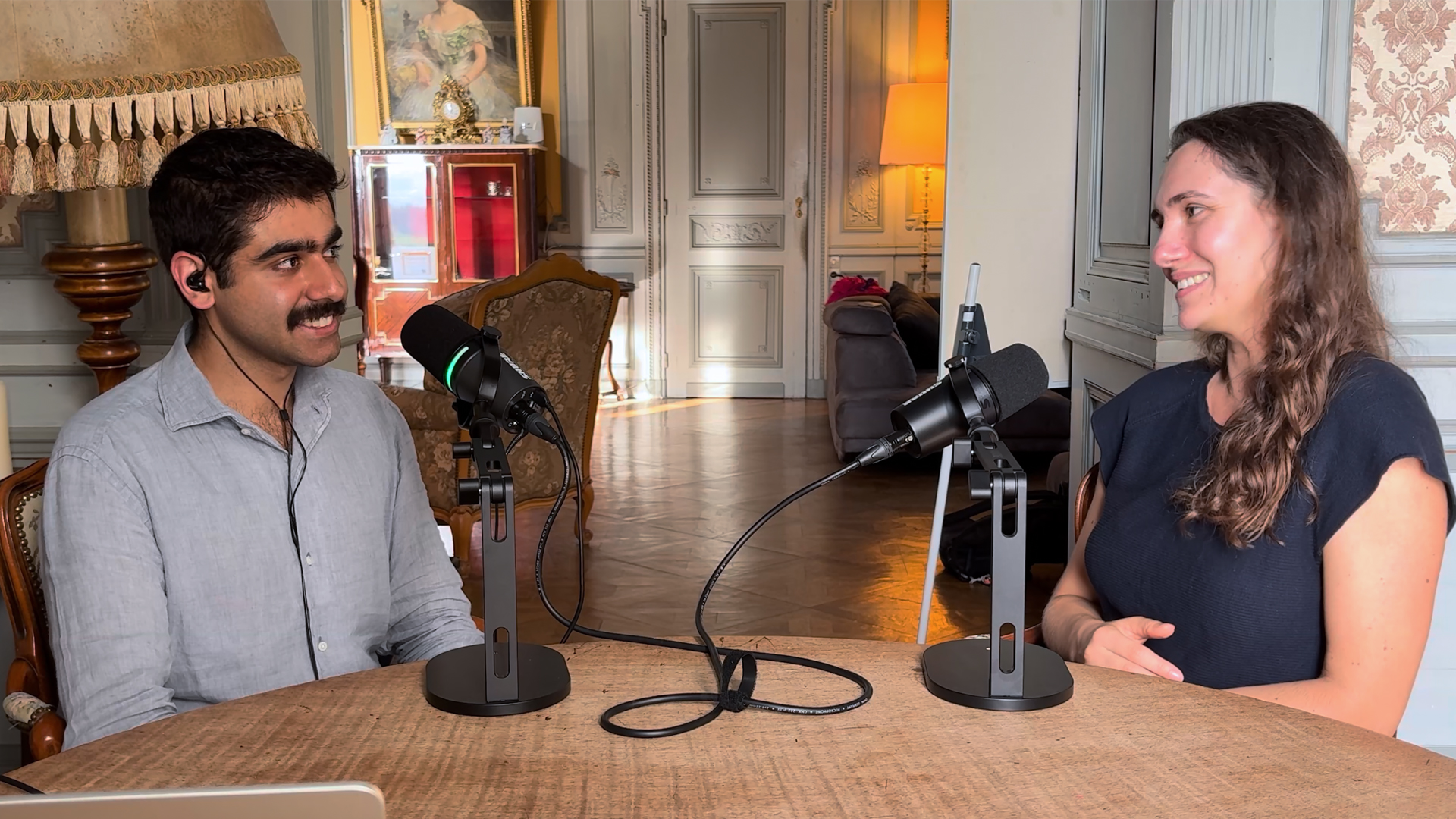
The Art of Negotiation: How an Events Manager Made the Impossible Remote
Jan 29, 2026Jeanne and I crossed paths at a co-living chateau in Normandy, where she works as a community host. Over the course of our conversation, what struck me most wasn't just her journey from Paris to the nomadic lifestyle; it was the strategic series of negotiations that made it all possible. From convincing her boss to let her work from Spain during Covid lockdowns to crafting a unique 3-on-3-off model that lets her live two lives at once, Jeanne's story is a masterclass in the power of asking for what you want.
The Boredom That Started It All
It was the second lockdown in Paris. The kind where you could go to work, go home, and do little else. Jeanne was sitting alone in her apartment, her roommates were out, and the city had ground to a halt. She was completely, utterly bored.
So she made a decision: she was going to learn Spanish. Not just take online classes from her Parisian flat; she was going to learn Spanish *in Spain*. And she was going to do it without losing her job.
There was just one problem: Jeanne worked for an event agency. A job that, by its very nature, demands you be on-site, managing productions, meeting with clients face-to-face. Remote event management? That wasn't a thing. At least, not until Covid forced everyone's hand.
Negotiation #1: Making the Impossible Remote
When Jeanne approached her boss in early 2021 with her proposal to work from Madrid for two months, there was pushback. Quite a bit of it, actually.
"There was a lot of pushback because I was working for an event agency, which is a job that literally asks you to be on site and to be on the production side. Plus client facing."
But Jeanne had done her homework. Covid had forced her small event agency to pivot hard into digital and online events. They'd developed virtual team buildings, online event strategies; anything to keep the business alive when in-person gatherings became impossible. And crucially, Jeanne had been there from the beginning as an intern, watching these new formats take shape.
Her pitch was simple: "I can still do those even if I'm outside of the country. The clients don't have to know. I can still produce the same way that I'm doing in Paris, at least for two months.”
It worked. In April 2021, Jeanne landed in Madrid with her laptop and a two-month window to prove that an events manager could work remotely. She found an apartment, dove into Spanish classes, and started working from a city she barely knew.
"I had no idea what Digital Nomad was. Co-living was like; I had just was like, I want to learn Spanish and I want to do it in Spain and I don't want to lose my job."
The irony? She ended up in a shared flat with all French roommates. Zero Spanish speakers. Her language learning plans didn't exactly pan out. But something else did: within the first week, Jeanne realised this was the life she wanted.
The Co-Living Discovery
After Madrid, Jeanne started searching for something she hadn't known existed before: a community of people living and working the way she was. She stumbled across Nine, a co-living space in Tenerife, in the Canary Islands.
In October 2021, she arrived at her first official co-living for a two-month stay. And this time, she wasn't alone in her lifestyle. There were others; digital nomads, remote workers, people who'd figured out how to untether their income from a fixed location. The feeling of "I'm the only one" that had followed her through Madrid evaporated.
The experience was transformative. The community, the lifestyle, the sense of belonging. It planted a seed. If living in co-living spaces felt this right as a guest, what would it feel like to work in one?
Negotiation #2: From Guest to Host
Fast-forward six months. Jeanne was scrolling through Facebook groups when she saw a post about a chateau in Normandy looking for a community host. It was one of those moments where curiosity meets opportunity.
"I don't know. I just thought, okay, maybe that's my sign. Like, maybe that's the place," she remembers. Natural curiosity kicked in. She sent an email. Within days, she was on a call with the owner. And before she knew it, she had a three-month hosting position lined up.
But there was still the small matter of her events job in Paris.
When I asked how she approached that conversation, Jeanne didn't hesitate: she went straight back to her boss with another proposal. Three months in Normandy. Still close enough to Paris that if there was an event emergency, she could return. And this time, she wasn't asking to do her existing job remotely; she was asking to split her time between two roles.
The answer was yes. Again.
The 3-On-3-Off Model: Living Two Lives at Once
What started as a three-month experiment turned into something more permanent, but not in the way you might expect. Jeanne didn't leave her event agency job immediately. Instead, she tried to do both: hosting at the chateau during the week, then flying back to Paris every Tuesday, returning Friday, and working weekends at the chateau.
"Every week I was going on Tuesday to Paris, coming back on Friday here and working during the weekend here. And I did that for two months," she says. It was intense. 80-hour work weeks. Constant travel. The kind of schedule that burns you out fast.
Eventually, she had to choose. But rather than choosing one life over the other, Jeanne negotiated a third option: she would work at the chateau full-time, but in three-month blocks. Three months on-site as a community host and marketing manager. Three months off, free to travel, visit other co-livings, and maintain her digital nomad lifestyle.
"I really felt that to be a good host and community leader, I needed to understand the lifestyle and keep living it for myself."
It's a model that shouldn't work, but it does. Because she understands what the guests are going through. She's lived the loneliness of working from an Airbnb in a foreign city. She's experienced the magic of walking into a co-living space and immediately feeling less alone. She knows what it takes to maintain focus while travelling, to balance work and exploration, to build community quickly.
When she's hosting, she brings that empathy to the role. When she's travelling, she's gathering insights to bring back. It's a feedback loop that makes her better at both.
Communication as a Superpower
Throughout our conversation, one theme kept surfacing: communication. Every major shift in Jeanne's journey, from Madrid to Nine to the chateau, happened because she asked for what she wanted.
"You can always ask for something. It doesn't mean you're going to have it, but you can always ask for it; there is no cost in it."
She's built her career in small, agile environments, first at an event agency during its early growth phase, now at a co-living chateau where roles evolve organically. These aren't places with rigid hierarchies or formal review processes. They're spaces where clear communication isn't just valued; it's essential.
But it's not just about asking. It's about trust. Jeanne admits she struggles with boundaries; she invests deeply in her work, building close relationships with the people she works with. She's drawn to projects at their beginning stages, where she can grow alongside them.
"I always kind of arrive at the beginning of the project and I get to evolve with it and I get to grow with it."
It's a strategy that wouldn't work in a corporate environment with vertical communication structures. But for Jeanne, that's exactly the point. She's carved out a career that plays to her strengths: flexibility, adaptability, and the ability to negotiate arrangements that serve both her and her employers.
The Lesson: If You Don't Ask, You Don't Get
Jeanne's journey didn't follow a typical path. She didn't quit her job and buy a one-way ticket. She didn't have a trust fund or a remote-first career lined up. What she had was a willingness to ask for what seemed impossible, and the communication skills to make it happen.
From convincing an events agency that their on-site manager could work from Spain, to negotiating a hybrid role that lets her be both a host and a nomad, Jeanne's story is proof that many jobs can be made remote if you're willing to have the conversation.
And if the first answer is no? You ask again. You propose an alternative. You find a way to make it work for everyone involved.
Because at the end of the day, the worst they can say is no. And sometimes, more often than you might think, they say yes.
Take some time to read some of Ibi's other blogs



